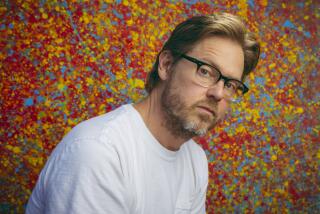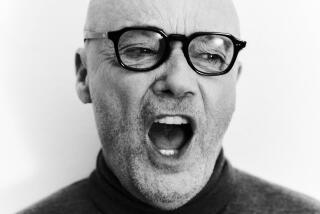Dude can play
Why do so many of us smirk when a Hollywood movie star picks up a guitar and walks toward a live microphone? Maybe it’s because, as songwriter Harlan Howard once said, music is about “three chords and the truth” and, really, an actor’s day job is about the closest you can come to lying for a living.
The question brought a sage smile to the 61-year-old face of Jeff Bridges, the Oscar winner who this week will release his first major-label album, a 10-song collection from Blue Note/EMI called “Jeff Bridges.”
“People like to put things in a box -- and they do that with their own lives too, they limit things -- but it’s all art to me,” Bridges said. “To me, all art is truth. People try to define things and make it easier for their mind to digest things, I guess. But music has been part of my life since I was a kid. Music meant more to me when I was young, but I went into acting because of family and because it was the path of least resistance.”
Bridges obviously inherited Hollywood opportunity from his movie-star father, Lloyd Bridges, but he proved himself quickly with an Academy Award nomination for his work in “The Last Picture Show,” a film that celebrates its 40th anniversary this October. The actor has been a persistent presence in Hollywood ever since, and recent years have been especially kind with “True Grit,” “Tron: Legacy,” “Iron Man” and his Oscar win for “Crazy Heart.”
It was “Crazy Heart” and the portrayal of a battered and besotted country singer named Bad Blake that led directly to the “Bridges” project. The soundtrack for the film was guided by T Bone Burnett -- the same producer who has won top Grammy Awards for his work on “O Brother, Where Art Thou” and with Alison Krauss and Robert Plant -- and the experience reenergized a friendship that dated three decades.
“Bone and I met back on [the 1980 Michael Cimino western] ‘Heaven’s Gate,’ and we would jam on the set with Kris Kristofferson and Steve Brouton and all their music friends,” Bridges said. “It was six months of playing together, and in a way all of this started back then. There’s a lot of history that’s led to this, and I don’t think this is going to be the end of it, either.”
Still, no matter how authentic the collaboration, Bridges will be viewed as a troubadour tourist by many casual observers, and his album will be viewed as a leading man’s vanity venture -- the same sort of reaction that greeted albums from Robert Mitchum, William Shatner, Bruce Willis, Russell Crowe and Don Johnson, to name just a few.
“So many actors play music, and so many musicians want to act,” said Bridges, who pointed out that he jammed with Bob Dylan while the two shared the screen in “Masked and Anonymous.” “And I’m really excited about working with Kevin Bacon in this new movie ‘R.I.P.D.,’ because he and his brother go out on the road and do concerts.”
As far as fans go, he said, “You do care what people think, you want people to dig your stuff, and you feel anxiety bubbling up, but I don’t dwell on that. I try not to care that I care so I can still take risks.”
In March, Bridges played a charity show at Santa Barbara’s grand old Lobero Theatre, and he brought plenty of firepower to the stage: Burnett led a band that included Buddy Miller on guitar and Greg Leisz on pedal steel. The sold-out audience cheered wildly even though Bridges at that point could clearly have used a bit more rehearsal to warm up his voice.
Backstage afterward, Burnett, munching on a cheese Danish, smiled when asked if critics should go easy on Bridges and judge him more by his charisma than his chops.
“We absolutely encourage all skepticism,” Burnett said. “This is not a lark. Jeff is one of our true artists today, and I wanted to work with him. His view of the world is as an artist; everything he takes in, he takes in as an artist. I wanted to document this artist in a way, and I don’t mind the skepticism. This isn’t something you need to listen to with a different standard.”
Bridges and Burnett began with a cache of 60 or 70 song possibilities and in the end recorded 17. Fans expecting a twang-heavy sequel to the “Crazy Heart” soundtrack will be surprised to find that this album is more beholden to the spirit of Tom Waits and Bob Dylan than it is to Waylon Jennings or Merle Haggard.
“I look to the director of a film to help take me past myself and my own conceptions of things, and with music, working with T Bone, I looked at him as the director who could help me transcend my conceptions and reach something beyond,” Bridges said. “He wanted to do an album that represented me. He knows the scope of the things I’ve been involved in.”
The album has the sort of California canyon vibe of Bridges, a sort of 1960s-informed denim worldview -- the actor paints, meditates and does ceramics -- but with the edge of a man who has worked and played hard in Hollywood since the Nixon years. And, yes, the album is available in vinyl.
In addition to Burnett, the name of guitarist Marc Ribot will catch the eye of music fans, as will guest vocalists Rosanne Cash, Ryan Bingham, Sam Phillips and Benji Hughes.
The early reviews have been upbeat and, of course, sprinkled with references to the actor’s signature role in “The Big Lebowski.” Spin said the album is “as comfortable and unpretentious as the Dude’s bathrobe,” even if the star’s drawl gets “wonky” in some spots; Entertainment Weekly gave the album a B-plus for “appealingly idiosyncratic cuts” and praised the Zen of lyrics that sound “spoken like the Dude himself.”
Bridges is working the television circuit this week with stops at the “Today” show on Tuesday, “Live! With Regis & Kelly” on Wednesday and “The Colbert Report” on Thursday. There’s also an “Austin City Limits” performance for a PBS airing this fall. The prospect of playing with Burnett and his team on that stage brought another big smile to the actor’s face.
“How do you describe it? There’s a wonderful kind of feeling of seeing all these other folks as an extension of yourself and your art. And rather than getting tight about it and feeling that you’ve got to navigate it and make it all the way you wanted it to be, there’s a better way of seeing them all as different aspects of yourself and losing your ego and giving it up to what this thing is and what it can be.”
--
More to Read
The biggest entertainment stories
Get our big stories about Hollywood, film, television, music, arts, culture and more right in your inbox as soon as they publish.
You may occasionally receive promotional content from the Los Angeles Times.










